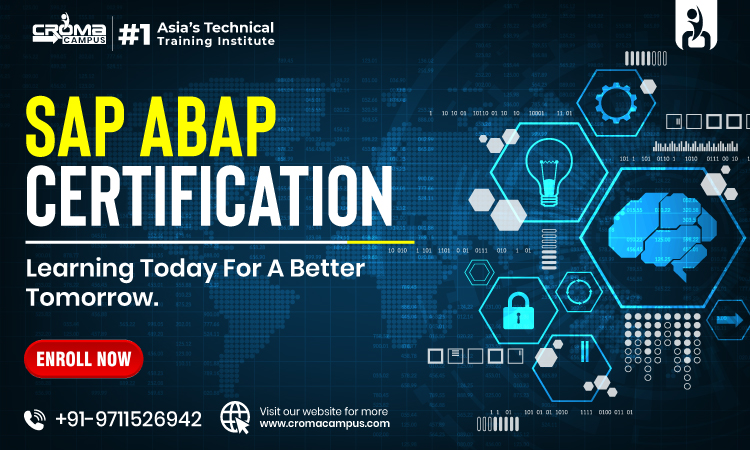Introduction
Embarking on a journey in the dynamic world of SAP (Systems, Applications, and Products) requires not only technical acumen but also specialized expertise. SAP ABAP certification stands as a testament to proficiency in customizing and extending SAP solutions. In today’s competitive landscape, this certification opens doors to lucrative opportunities. The SAP ABAP Course empowers individuals to excel in SAP development and contribute meaningfully to organizations worldwide.
The SAP ABAP Certification
SAP ABAP (Advanced Business Application Programming) is a high-level programming language developed by SAP for customizing and extending SAP applications. It enables developers to create custom reports, interfaces, and enhancements within the SAP environment. Moreover, ABAP is integral to SAP’s software ecosystem, facilitating data processing, business logic implementation, and user interface development. With ABAP, developers can tailor SAP solutions to meet specific business requirements, ensuring seamless integration and efficient functionality across various SAP modules.
The SAP ABAP certification validates expertise in the Advanced Business Application Programming language, essential for SAP’s software customization and development. Furthermore, The certification assesses proficiency in various ABAP concepts, including data dictionary, ABAP Workbench, ABAP Objects, and debugging techniques.
Candidates must demonstrate mastery in designing, implementing, and troubleshooting ABAP-based solutions within SAP systems. Successful certification enhances career opportunities by showcasing the ability to develop robust applications tailored to business needs, optimize system performance, and integrate diverse SAP modules seamlessly.
Additionally, it validates one’s proficiency in leveraging ABAP’s advanced features for enhancing system functionality and delivering efficient business solutions. Thus, achieving the SAP ABAP certification signifies a deep understanding of SAP technologies, thereby, positioning professionals as valuable assets for organizations seeking skilled SAP developers.
How To Get This Certification
This section provides insight into the steps to get the SAP ABAP certification and brief details about the certification prerequisites.
Certification Prerequisites
To pursue SAP ABAP certification, candidates typically need foundational knowledge of programming concepts, database management, and SAP basics. While specific prerequisites may vary based on the certification level, familiarity with SAP systems, data structures, and object-oriented programming is beneficial.
There are some object-oriented programming is beneficial.
- Basic Knowledge of SAP: Familiarity with SAP’s ecosystem and business processes is essential.
- Programming Skills: Proficiency in programming concepts such as variables, loops, and functions is required.
- ABAP Fundamentals: Understanding of ABAP syntax, data types, and basic programming constructs.
- Experience with ABAP Workbench: Hands-on experience with ABAP development tools like ABAP Editor, Debugger, and Data Dictionary.
- Knowledge of SAP Modules: Understanding of SAP modules like FI, CO, SD, MM, etc., and their integration with ABAP.
- Training Courses: Completion of ABAP training courses or workshops offered by SAP or authorized training partners.
- Practical Experience: Some certifications may require practical experience in ABAP development projects.
Steps To Get This Certification
Obtaining SAP ABAP certification requires thorough preparation and meeting specific criteria. Here’s a step-by-step guide:
- Assess Prerequisites: Ensure you meet the prerequisites such as basic SAP knowledge, programming skills, familiarity with ABAP fundamentals, experience with ABAP Workbench, understanding of SAP modules, completion of relevant training courses, and practical experience in ABAP development.
- Choose Certification Path: SAP offers various ABAP certification exams catering to different skill levels and roles, such as Associate, Professional, and Developer certifications. Select the certification path that aligns with your career goals and expertise level.
- Enrol in Training: Enrol in SAP ABAP Certification training courses provided by SAP Education or authorized training partners. These courses cover essential topics, provide hands-on exercises, and prepare you for the certification exam. Options include classroom training, virtual live classrooms, and e-learning modules.
- Self-Study: Supplement your training with self-study resources such as SAP documentation, ABAP programming books, online tutorials, and practice exercises. Familiarize yourself with ABAP programming concepts, ABAP Workbench tools, data dictionary, and SAP module integration.
- Practice Hands-On: Gain practical experience by working on ABAP development projects, either within your organization or through freelance opportunities. Moreover, Practice writing ABAP code, creating custom reports, interfaces, enhancements, and debugging programs to reinforce your skills.
- Review Exam Blueprint: Review the exam blueprint provided by SAP, which outlines the topics covered in the certification exam. Further, Focus your preparation on mastering these areas to ensure comprehensive understanding and readiness for the exam.
- Take Practice Exams: Access SAP ABAP practice exams to assess your knowledge, identify areas for improvement, and familiarize yourself with the exam format. Practice exams simulate the actual exam environment, helping build confidence and test-taking skills.
- Schedule Exam: Once you feel confident after preparing for the SAP ABAP Course, schedule the certification exam through the SAP Training and Certification Shop or authorized Pearson VUE testing centers. Further, Choose a convenient exam date and location.
- Take the Exam: On the scheduled exam day, arrive early at the testing center, bring valid identification, and be prepared to demonstrate your ABAP knowledge and skills through the exam questions.
- Receive Certification: Upon successful completion of the exam, you’ll receive your SAP ABAP certification, validating your expertise and enhancing your career opportunities. There, SAP development and customization. Keep your certification up-to-date by staying informed about the latest SAP technologies and advancements.
Benefits Of the SAP ABAP Certification
SAP ABAP certification offers several benefits, including enhanced career prospects, increased earning potential, and recognition of expertise in SAP development.
- Enhanced Career Opportunities: SAP ABAP certification opens doors to various job roles such as ABAP developer, SAP consultant, and technical analyst.
- Industry Recognition: Certification validates expertise in ABAP programming, earning recognition from employers and peers within the SAP ecosystem.
- Increased Earning Potential: Certified professionals often command higher salaries compared to non-certified counterparts due to their specialized skills.
- Expanded Skillset: Certification demonstrates proficiency in SAP development, data modeling, and system customization, broadening career prospects.
- Job Security: With the demand for SAP professionals on the rise, certification provides job security and opportunities for career advancement.
- Access to Exclusive Resources: Certified individuals gain access to SAP’s extensive network, events, and resources for continuous learning and professional development.
Conclusion
In summary, SAP ABAP Certification offers a gateway to a rewarding career in SAP development and customization. With industry recognition, enhanced skills, and increased opportunities, certified professionals are well-positioned to thrive in the dynamic landscape of SAP technology and contribute significantly to organizational success.



